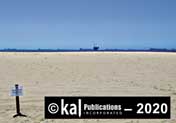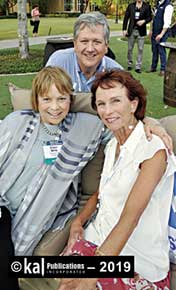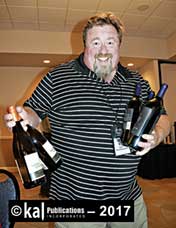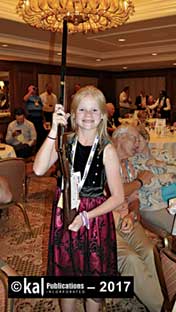
September 2020 Issue Highlights
For more complete coverage, send us an e-mail to
request a back
issue.

For more complete coverage, send us an e-mail to
request a back
issue.

COVID-19 Offshore Tankers

7-11 to Acquire Speedway

SIGMA Spring Meeting 2019

Oregon Fuels Association Convention 2017

Idaho Petroleum Marketers and Convenience Store Association Convention 2017
Want to see the photos that didn't make the issue? Check out the Cutting Room Floor.
7-Eleven to Buy Speedway for $21 Billion
Marathon Won't Restart Two Western Refineries
HollyFrontier to Convert Wyoming Refinery to Renewable Diesel
SME Acquires Grand Ronde Petroleum Service
Conventions and
Trade Shows Fall Victim to COVID-19
FINDLAY, OH. — Marathon Petroleum has signed a deal to sell its Speedway service station network to 7-Eleven Inc., of Irving, TX., for $21 billion in cash.
Included the deal are approximately 3,900 Speedway stores located in 36 states, including Alaska, Arizona, California, Colorado, Idaho, Nevada, New Mexico, Oregon, Utah, Washington, and Wyoming in the West.
As part of the agreement, Marathon will supply 7-Eleven with approximately 7.7 billion gallons of fuel per year for 15 years. It includes the company's West Coast direct dealer fuel supply business which handles independent owners and operators, including the company's Arco-branded sites.
"This acquisition is the largest in our company's history and will allow us to continue to grow and diversify our presence in the U.S., particularly in the Midwest and East Coast," said Joe DePinto, president of 7-Eleven, announcing the deal. "By adding these quality locations to our portfolio, 7-Eleven will have the opportunity to bring convenience to more customers than ever before."
At the close of the sale, 7-Eleven will operate approximately 14,000 locations across the United States and Canada. This will give the c-store chain "a presence in 47 of the top 50 most populated metro areas in the U.S., positioning the company as a clear industry leader in a fragmented industry," according to 7-Eleven officials.
Marathon had announced in October of last year that they planned to spinoff their Speedway division after being pressured by investors. At the time, Marathon Chairman Gary Heminger said the company decided to "create shareholder value" by splitting off the company's retail and convenience store operations by the end of 2020.
Marathon was reportedly in talks to sell Speedway in the Spring to Seven & I Holdings Company, the Japanese parent company of 7-Eleven convenience stores for approximately $20 billion but the sale fell through when the Corona Virus hit and both parties walked away.
In a filing with the Securities and Exchange Commission in June, Marathon said it would postpone the spinoff of Speedway until next year "in light of the impacts of the COVID-19 pandemic on market conditions" but, clearly, had been continuing talks with potential suitors.
"This transaction marks a milestone on the strategic priorities we outlined earlier this year," stated Marathon President Michael Hennigan. "Our announcement crystalizes the significant value of the Speedway business, creates certainty around value realization and delivers on our commitment to unlock the value of our assets. At the same time, the establishment of a long-term strategic relationship with 7-Eleven creates opportunities to improve our commercial performance."
7-Eleven officials pointed to the fact that Speedway and 7-Eleven have complementary geographic footprints with little overlap. They say this will allow the company to "accelerate their growth" as well as diversify their presence across the United States.
7-Eleven is currently putting together an Integration Steering Committee with leadership from both 7-Eleven and Speedway. They company says "Brand 7-Eleven looks forward to welcoming the approximately 40,000 members of the Speedway team into the 7-Eleven family and integrating best practices of both companies."
The sale is expected to close in the first quarter of 2021, pending stockholder and regulatory approvals.
7-Eleven operates, franchises and/or licenses more than 71,100 stores in 17 countries, including approximately 11,800 in North America.
FINDLAY, OH. — Marathon Petroleum Corporation has announced that it won't restart the refineries in California and New Mexico that the company shut down earlier this year.
The facilities — the 166,000 barrel-per-day Martinez, CA., refinery and the 26,000 barrel-per-day Gallup, NM., refinery — were shut down in April when the demand for gasoline, diesel, and jet fuel plummeted due to COVID-19 as drivers and travelers were mandated to stay home. The two refineries were chosen to close because they were "the highest-cost facilities" among the company's 16 refineries.
At the time, Marathon officials said the plan was to "temporarily idle" the refineries and restart them as demand returned.
At the beginning of August, Marathon announced it was "unlikely" that demand for fuels will return to pre-pandemic levels in the near future.
The Martinez refinery will be converted into a terminal facility for the San Francisco Bay area and Northern California. Marathon said they may also build a renewable diesel plant on the Martinez property "to align with California's Low Carbon Fuel Standards objectives."
The Gallup refinery will be closed.
Marathon said they will "begin a phased-out reduction of staff" at the two locations shortly.
CHEYENNE, WY. — HollyFrontier announced that they will convert their refinery here to manufacture alternative fuels.
The Cheyenne refinery will be rebuilt to quit using crude oil as a feedstock and instead refine renewable diesel. The company expects to use soybean oil, recycled cooking oil and animal fats for its new feedstocks.
The company made the decision to convert the refinery after low demand due to COVID-19 dropped margins in the Spring and early Summer, making maintenance on the older refinery in Wyoming "uncompetitive." In addition, HollyFrontier noted increased demand for renewable diesel, driven by government mandates and consumer desires.
The cost to convert the refinery is expected to run $125 million to $175 million. HollyFrontier expects the capacity to be approximately 90 million gallons per year of renewable diesel by the first quarter of 2022.
"Demand for renewable diesel, as well as other lower carbon fuels, is growing and taking market share based on both consumer preferences and support from substantial federal and state government incentive programs," said Mike Jennings, HollyFrontier CEO, announcing plans in June to convert the refinery.
HollyFrontier expects the Wyoming refinery will be able to make money from both the sale of the fuel and the generation of RFS credits which can also be sold.
The last traditional crude runs were expected to be completed by the beginning of August.
LAKEWOOD, WA. — SME Solutions LLC has acquired Grand Ronde Petroleum Service LLC, effective as of July 1, 2020. The purchase price was not disclosed.
Based in Kennewick, WA., Grande Ronde Petroleum Service was an authorized service contractor for Gilbarco, Veeder-Root, Verifone, OPW, PetroVend, and Bennett Pump. The company covered the territory of eastern Washington and eastern Oregon.
According to SME, all of the GRP staff including dispatcher Krystal Lusch, technicians Doug Dawson, Christopher Mahoney and Nathen Tarr, and electrician Jim Robinson will be joining SME and the existing GRP offices in Kennewick will remain open. Jason Franke, who was based in the Tri-Cities area with SME will now serve as a the area service manager following the acquisition.
Gary Jones, who had been serving as president and owner of the company "will be working through the transition with plans to retire in the near future."
"This great opportunity to expand the SME footprint and acquire the exceptional talent and service offered by GRP fits perfectly with SME's plan to be the best service provider in the Pacific Northwest," said SME President Mark Able, in a letter to the company's customers.
"Adding the Tri-Cities location to our existing coverage will allow us to continue to grow and support both companies' long-term customers."
Northwest Pump & Equipment holds a 50% ownership of SME Solutions LLC.
With the COVID-19 pandemic continuing as 2020 rolls along, the cancellation of major conventions and trade shows has continued.
While event planners expected delayed shows to be able to go forward in the late Summer and Fall, government officials also expected the number of COVID cases to drop as the weather turned warm.
Instead, especially in California, the number of COVID cases continued to rise and California officials kept the state ratcheted down, keeping businesses closed, mandating masks, shutting off access to beaches and parks, and shutting schools.
As several Western Governors allied themselves with California Governor Newsom, saying they would not lift restrictions until California did so, much of the West Coast has remained locked down during the Summer months.
Hawaii has maintained a strict 14-day quarantine policy for travelers which has virtually closed the state. All passengers arriving in the Hawaiian islands — whether locals or tourists — must self-quarantine for two weeks.
Not surprisingly, virtually every event has been removed from the calendar as shutdowns continue.
After 60 years of bringing the petroleum industry together, the Pacific Fuels + Convenience Summit (formerly known as the Pacific Oil Conference) has been cancelled for 2020 due to COVID-19 concerns. The PFCS was scheduled for September 8-10 in San Diego, CA.
"While this development is unfortunate, our top priority is, and always will be, the best interests of the people that make up our amazing industry," stated 2020 PFCS General Chairman Morgan Dewar, J.B. Dewar Inc., San Luis Obispo, CA., announcing the decision to cancel the show. "While we are disappointed we could not share all we had in store for 2020, our resolve to return even better in 2021 has never been stronger." The next PFCS Show is scheduled for San Diego on September 7-9, 2021.
The joint convention of the National Association of Convenience Stores and the Petroleum Equipment Institute looked like it was going forward. The convention planners had devised a way to break the attendees into groups to allow social distancing at the trade show and even had added "cleaning breaks" into the schedule.
On July 30, the day after the proposed new schedule had been sent to attendees, NACS and PEI shared the bad news: the Las Vegas Convention and Visitors Authority informed the associations that the 2020 show, scheduled for October 11-14, could not be held due to the ongoing pandemic.
"It is with heavy heart that we make this announcement," said NACS President and CEO Henry Armour. "We had worked closely with the health department with jurisdiction, the LVCVA, our official partners, vendors and other stakeholders to develop a world-class 'city within a city' that prioritized safety for our attendees and staff."
Armour added, "There are issues beyond our control that led to this decision."
Rick Long, executive vice president of the PEI, let his members know that the PEI convention "cannot be held in Las Vegas due to Nevada meeting restrictions and unrelenting COVID-19 cases in the state."
Both NACS and the PEI say they are looking to offer "virtual conventions" in the Fall.
Automotive Aftermarket Industry Week, the joint conventions of SEMA and AAPEX in Las Vegas, suffered the same fate a few days after the NACS/PEI Convention: they were shut down by the Nevada government.
AAPEX officials noted, "Given the State of Nevada's recently announced long-term mitigation strategy for the COVID-19 pandemic, which has indefinitely prohibited events with more than 50 participants, and the severe limitations on international and domestic travel imposed in connection with the pandemic, unfortunately, the traditional in-person event cannot proceed."
The SEMA and AAPEX shows are also planning virtual events in place of their traditional trade shows.
Originally published in the
September 2020 issue of O&A
Marketing
News.
Copyright 2020 by KAL Publications Inc.
Serving the 13 Western States, the World's Largest Gasoline, Oil, Fuel, TBA and Automotive Service Market